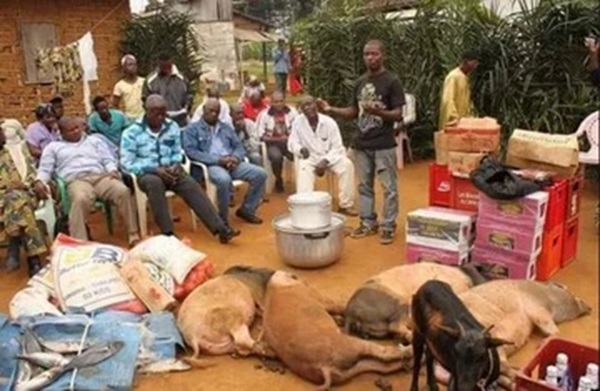Upper East native petitions chiefs to standardise and reduce bride price in region
 Bride Price payment underway
Bride Price payment underway
A concerned native of the Upper East Region, Emmanuel Atindah, has formally petitioned the Upper East Regional House of Chiefs to review and standardise bride price requirements across the region, citing growing economic hardships and cultural inconsistencies.
In a detailed three-page petition addressed to the President of the House, Chiana-Pio Pe Ditundini Adiali Ayagitam III, Mr. Atindah, who hails from the Bongo district, proposed a uniform bride price of one cow and four sheep.
He argued that the current demands for traditional marriage rites have become exorbitant, discouraging many young men from undertaking customary marriages.
Speaking on a Bolgatanga-based radio station, Mr. Atindah lamented the "growing disparity in bride price demands" across various districts in the region.
“Some communities are requesting up to four cows, while others demand two cows and seven sheep,” he noted.
“This inconsistency confuses, particularly in inter-district marriages, and places unnecessary financial strain on families.”
He warned that the high costs associated with traditional marriages could lead to a decline in cultural practices, as couples may opt for civil unions or cohabitation to avoid the burdensome expenses.
The petition urges the House of Chiefs to initiate region-wide consultations among traditional leaders to agree on a realistic and culturally respectful standard that upholds tradition while easing the process for prospective grooms.
Mr. Atindah’s call has sparked widespread discussion across the Upper East Region, with many residents applauding the initiative as a timely and necessary intervention.
Community members say it reflects a growing awareness of the need to balance tradition with present-day economic realities.
While the Upper East Regional House of Chiefs has not yet issued an official response, the petition is already stirring conversations among traditional leaders, elders, and youth groups about the future of customary marriage practices in the region.
Source: Classfmonline.com/Moses Apiah
Trending Entertainment

''We have lost the Essence of our culture” – Actor Kunle Remi reacts to IShowSpeed’s Nigeria visit
18:38
Kwabena Kwabena condemns growing materialism in modern relationships
14:02
“I was in love, someone took my chick, and I felt helpless” — Kwabena Kwabena reveals inspiration behind ‘Mene Woa’
13:43
IShowSpeed gets royal shea butter treatment during visit to Hamamat Montia’s museum in Accra
02:02
'I'm not a Nazi': Ye details Bipolar struggles, regrets, and path to recovery, tracing cause to 2001 car accident
00:57
Sly Dunbar, prolific legend of reggae, dies aged 73
00:36
IShowSpeed declares Nigeria winner after tasting Ghana jollof
02:09
E/R: IShowSpeed receives traditional Ghanaian name during cultural tour
22:40
Tonto Dikeh reunites with ex-husband after 10 years: Actress credits God for restoration
20:28
Yaw Sarpong’s family withheld news of Maame Tiwaa’s passing to protect his health
18:39




